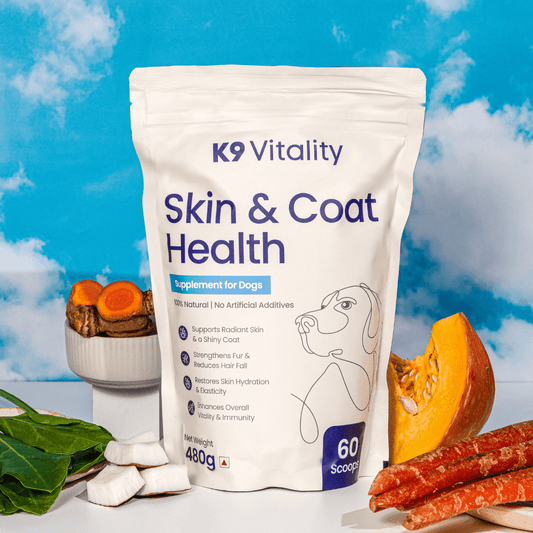
Are Dog Supplements Necessary? Learn More!
Share
In today's world, pet owners are more invested than ever in ensuring their furry companions lead long, healthy lives. One way they achieve this is through the use of dog supplements. Approximately one-third of dog owners provide their pets with supplements to address various health concerns, including joint health, skin issues, digestion, heart health, and more. In this guide, we'll dive into the world of dog supplements, exploring their types, how they work, and what veterinarians recommend.
Understanding Dog Supplements
Dog supplements are products designed to enhance a pet's regular diet by providing specific ingredients aimed at improving their health. While choosing a dog supplement, it is important that you prioritize quality over anything. This will make sure that you are providing your dog with the best and ensure effective results.
Now, let's explore some of the most commonly used dog supplements and their potential benefits.
Glucosamine for Joint Health

One of the most sought-after supplements for dogs is glucosamine. Derived from the shells of shellfish or produced in a laboratory, glucosamine is a vital amino sugar found naturally in joint fluid, contributing to cartilage development.
Many dog owners and veterinarians believe that glucosamine effectively treats arthritis in dogs. Older dogs may experience relief from joint pain and improved mobility with glucosamine supplementation. While some studies have shown limited effects, others indicate significant pain reduction and increased mobility after consistent use for around 70 days.
Glucosamine supplements come in various forms, such as pills, powders, and chews, and often include chondroitin sulfate, which naturally occurs in bone and cartilage connective tissues.
To learn about Glucosamine Supplements in detail. Click here!
Fish Oil for Skin and Coat Health

Fish oil is another commonly administered supplement for dogs. Packed with omega-3 fatty acids, fish oil aims to enhance coat quality, shine, and address skin allergies. Research has explored its potential benefits in arthritis, heart health, and joint health, although results remain mixed.
Some studies suggest that fish oils possess anti-inflammatory properties, making them appealing to many dog owners. However, always consult your veterinarian, especially if your dog is on medication, to ensure the safety and appropriateness of fish oil supplementation.
Antioxidants to Combat Aging
Antioxidant supplements are often recommended to counteract the effects of aging in dogs, including memory loss and cognitive dysfunction. They're also employed in treating heart disease and reducing inflammation.
Antioxidants, such as vitamins C and E, safeguard the body against free radicals—harmful molecules capable of damaging cell membranes and causing cell death. Coenzyme Q10 is another potent antioxidant frequently used to boost energy production and combat free radicals.
Probiotics for Digestive Health

Just as probiotics have gained popularity in human health, they've found their way into the canine world. Probiotics naturally reside in a dog's digestive system, consisting of beneficial live bacteria that promote good digestion and intestinal health.
In supplement form, probiotics can effectively treat digestive issues like diarrhea. They come in various forms, including yogurt, capsules, chews, powders, liquids, gels, and even certain dog foods tailored for digestive health.
To learn more about Probiotics for Dogs. Click Here!
Vitamin and Mineral Supplements
Vitamins and minerals play vital roles in a dog's overall health. They are essential for normal body functions, and while a well-balanced diet is a cornerstone of nutrition, some dogs may benefit from supplements.
Vitamins come in two types: fat-soluble (A, D, E, and K), which are stored in fatty tissues and the liver, and water-soluble (B and C), which are eliminated through urine daily. These nutrients, whether fat-soluble or water-soluble, are crucial for various bodily functions, including immune support and energy production.
However, minerals can be a bit more complex. There's ongoing debate among veterinary experts regarding the dosages and specific minerals needed for optimal canine health. Nonetheless, minerals are indispensable, assisting in energy production, maintaining electrolyte and fluid balances, and facilitating nerve transmission.
Glucosamine and Chondroitin Dog Supplement

As we delve further into the realm of dog supplements, it's essential to explore the dynamic duo of joint health: glucosamine and chondroitin. These compounds are common ingredients in many joint supplements, and they make up a compound typically found in cartilage.
Supplements containing glucosamine and chondroitin are often administered to dogs with conditions like hip dysplasia, osteoarthritis, cartilage damage, or loose joints. These compounds support joint cartilage health and lubricate the joints' fluid, potentially improving mobility and reducing discomfort.
It's worth noting that glucosamine typically requires long-term use to yield noticeable benefits. It's not a quick fix for arthritis or joint issues in dogs. Your veterinarian can guide you on the best approach, which might include both a joint supplement and pain medication, depending on your dog's specific health needs.
The best Glucosamine and Chondroitin Supplement for dogs.
The Role of Fatty Acids in Skin and Heart Health
Fatty acids, a term encompassing linoleic acid, linolenic acid, and arachidonic acid, play a pivotal role in maintaining a dog's skin and coat health. These fatty acids also contribute to preventing cholesterol buildup and heart disease.
Ensuring your dog receives an adequate supply of these fatty acids can lead to healthier skin, a shinier coat, and better heart health. While many commercial dog foods contain these essential fatty acids, supplementation can be beneficial for dogs with specific skin or coat concerns.
Unmasking the Power of Digestive Enzymes
Digestive enzymes, often overlooked heroes in canine nutrition, deserve a special mention. These proteins catalyze biochemical reactions, each type specializing in processing specific substances. Protease tackles proteins, amylase handles carbohydrates, lipase manages fats, and cellulase breaks down fiber.
In raw, fresh foods, these enzymes naturally abound, but the high-temperature processing of most commercial dog foods destroys them. Supplementation with digestive enzymes—whether through fresh food or supplements—can ease the digestive workload, reducing the strain on the body.
This can be especially beneficial for dogs on homemade diets, which may not undergo rigorous veterinary or nutritional scrutiny. In such cases, a veterinarian or veterinary nutritionist can help ensure your dog's diet is balanced and complete, potentially recommending digestive enzyme supplements to bridge nutritional gaps.
Probiotics: A Gut-Friendly Ally
Probiotics, often referred to as "friendly bacteria," hold a unique place in canine nutrition. These microorganisms play a vital role in food digestion and inhibit the growth of harmful fungi and microbes within the gut.
Lactobacillus acidophilus, a common probiotic supplement, can help the body combat yeast and fungal infections that may follow antibiotic treatment. These supplements are available in various forms, from capsules and powders to pastes and purees, making it convenient to integrate them into your dog's diet.
The Best Probiotic Supplement for Dogs
Are Dog Supplements needed?

As we explore the complex world of dog supplements, it's crucial to consider when and why supplementation is necessary. Only two legitimate reasons justify supplementing your dog's diet.
The first reason revolves around correcting deficiencies that have led to poor health, compromised vitality, or low energy levels. Holistic veterinary nutrition experts often point out that some commercial dog foods provide subpar nutrient sources. For dogs exclusively consuming commercial diets, supplementation with a basic multivitamin and mineral supplement may be warranted.
Additionally, some holistic veterinarians argue that modern farming practices have compromised the nutrient content of both human and pet food. In this context, supplementing with multi-vitamin/mineral combinations becomes a philosophical debate.
The second valid reason for supplementing your dog's diet is to bolster their defenses in anticipation of specific challenges. For example, vitamin C is well-known for its immune-boosting properties and antiviral potential. By strategically supplementing with vitamin C, you can enhance your dog's ability to combat infections.
However, the key challenge lies in determining precisely what supplements your dog needs. Product labels, advertisements, and website claims won't provide the answers. Only a comprehensive health history intake and examination by a veterinarian and lab tests, can identify nutrient deficiencies accurately. Moreover, the recommendations of an experienced nutrition expert, tailored to your dog's unique needs, are indispensable for ensuring the safety and effectiveness of supplements.
Do Dog Supplements Work?
Now that we have discussed the need of dog supplements. Let's find out if dog supplements work.
The answer isn't a simple yes or no. It's a nuanced exploration of what supplements can and cannot do for your dog's health.
Let's start with what dog supplements can do. Some dogs can benefit significantly from supplements. For instance, glucosamine and chondroitin are common ingredients in joint supplements. Studies suggest they can help maintain joint health and alleviate conditions like arthritis in certain dogs. Similarly, fatty acid supplements, like omega-3s, can enhance skin and coat quality, reduce inflammation, and even support heart health.
Probiotics, often recommended for digestive health, can indeed assist in resolving gastrointestinal issues. Antioxidant supplements may counteract aging effects, promote heart health, and reduce inflammation.
But here's the catch: supplements are not a one-size-fits-all solution. Their efficacy depends on various factors, including the dog's health, age, and specific needs. What works for one dog may not work for another.
Moreover, supplements aren't a magical cure for severe diseases. They can support overall health and potentially mitigate certain issues, but they won't miraculously cure cancer, parvovirus, or other major illnesses. Always consult your vet for appropriate treatment.
Quality matters too. Not all supplements are created equal. Choosing reputable brands and following your vet's recommendations is crucial.
Conclusion
In conclusion, dog supplements have emerged as valuable tools in maintaining our pets' health and well-being. With proper guidance from your veterinarian and a discerning approach to supplement selection, you can unlock the potential benefits these supplements offer, helping your canine companion lead a longer, healthier life. After all, isn't that what every dog owner wants for their furry friend?
As we conclude this journey through the world of dog supplements, remember that your dog's well-being is paramount. Pay close attention to their health, noting any improvements or declines in appearance and vitality. Adjust your approach accordingly, always prioritizing your pet's health and happiness. With the right supplements, backed by expert advice, you can provide your beloved canine companion with the best possible care.






